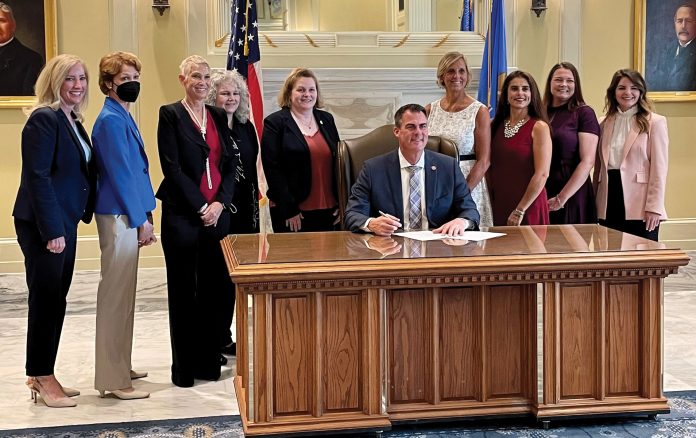

Oklahoma legislation recently signed into law that aims to provide better protection and quicker services for victims of domestic violence. The legislation is based on decades of work and research by Janet Wilson, Ph.D., R.N., a nursing scientist at the Fran and Earl Ziegler College of Nursing at the University of Oklahoma Health Sciences Center.
Senate Bill 17 legislates an intervention conducted by all Oklahoma law enforcement when they respond to calls of domestic violence. The intervention takes the form of an 11-question screening that assesses the level of danger, the threat of death, and whether someone needs immediate help. If the victim scores high on the screening, police call a collaborating crisis center or social service agency for immediate help. The law goes into effect Nov. 1. (story continues below)

Cedar Crest Manor in Lawton OK is hiring for a Director of Nursing to join our family owned facility. Strong understanding of Skilled Nursing Facility Regulations, clinical skills and leadership practices. Must have RN license. Experience: Two years in Long Term care as LPN or RN. Experience with communicable Diseases. Benefits: · Health Insurance · Life insurance · Vision and Dental · 401 K Matching · Life insurance · Opportunity to earn quarterly bonuses
If you are interested in applying or learning more about this position, please send resume to [email protected]
www.cedarcrestmanor.org
“It is exciting to see this legislation signed into law and to know that it will connect women and children to domestic violence services for their safety,” Wilson said. “It wasn’t so many years ago that society didn’t talk about domestic violence. Or if people knew about violence that was occurring, they would tell the woman to just leave the relationship. It’s never been that simple. The intervention that was just signed into law has research behind it to show that it increases the number of domestic violence victims getting the help that they need.”
The legislation is the culmination of a 50-year career for Wilson, who is retiring this year from the OU College of Nursing. In 2001, her years of work led to the creation of the Oklahoma Domestic Violence Fatality Review Board. The group, now part of the Office of the Oklahoma Attorney General, analyzes the circumstances around each death caused by domestic violence, continually improving the method of helping victims of violence and increasing the likelihood that they will stay alive. The approach was novel at the time because it brought together many different groups working on domestic violence issues, including social services, police, healthcare providers, advocates, academicians and others.
“The idea of interprofessional teams was new then,” Wilson said, “because all the agencies involved in responding to domestic violence were in siloes. They weren’t talking to one another. By coming into alignment, we were able to collaborate and coordinate services and offer pragmatic suggestions for reducing injuries and preventing deaths. We also invited families of victims to come to the fatality reviews so they could give us suggestions of what we could do better.”
Soon after the board was established, Wilson began working on the intervention that was just signed into law. In years past, when police responded to calls of domestic violence, they gave victims a card with contacts for various services. However, it was incumbent upon the victim to seek help and a low number did so, Wilson said. She believed that police needed a tool — officially called a lethality assessment — to determine how much danger a person is in at the moment.
“That was the key to it – it had to be done immediately or women would fall through the cracks,” she said. Wilson identified an existing lethality assessment protocol, developed by Jacquelyn Campbell, Ph.D., R.N., of Johns Hopkins School of Nursing, and obtained a research grant to study its effectiveness. Working with a large team that included professionals from the OU Health Sciences Center, Johns Hopkins University, Arizona State University, the Oklahoma State Department of Health, the Office of the Oklahoma Attorney General, several police departments, police advocates and others, Wilson and her colleagues studied whether the lethality assessment would result in more women seeking help than they did when police simply handed them a card.
When the data was analyzed, Wilson discovered that the lethality assessment indeed resulted in more women connecting with services to keep them and their children safe. The 11 questions that police ask to determine the risk level include, for example, whether someone has used a weapon against the victim or made threats with a weapon; threatened to kill the victim or her children; tried to choke the victim; and is violently or constantly jealous.
Wilson is retiring having seen her research come full circle. “It has been a step-by-step process,” she said. “Perseverance and bringing domestic violence service providers and victims together to reduce deaths and injuries is the main thing. This was certainly not recognized as a public health problem when I started, but I feel like we’ve raised awareness about intimate partner violence for better protection for families and communities.
“People have sometimes asked me, ‘Doesn’t this work depress you?’ I say, ‘No. Every woman’s story and every family’s story is a story of resilience.’ That has been a big motivator for me.”












